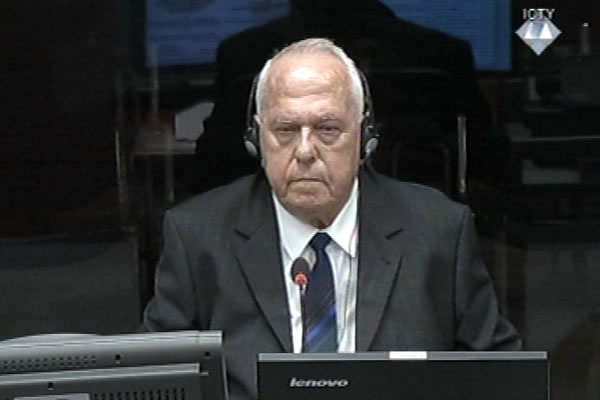Home
PRIME MINISTER KNEW NOTHING ABOUT RAPE
Former Bosnian Serb prime minister Vladimir Lukic claims his government protected all the citizens regardless of their ethnic background. The prosecutor put it to him that the authorities did nothing about the crimes, except in those cases when Serbs, rather than Muslims and Croats, were the victims. The witness knew nothing about the rape of non-Serb girls and women on several locations in BH, ‘because he wasn’t there’
 Vladimir Lukic, defence witness at Rako Mladic trial
Vladimir Lukic, defence witness at Rako Mladic trial Ratko Mladic’s defense tendered into evidence the statement of war-time Republika Srpska prime minister Vladimir Lukic. In the statement Lukic said the Bosnian Serb leadership treated all the citizens equally irrespective of their ethnic background. His government, Lukic claimed, issued orders to the police and the army to use ‘all legal means at their disposal’ to protect the population. However, it was not possible to control the situation in the field. One of the reasons for that, according to Lukic, was that the local authorities were able to act with such a degree of autonomy during the war that Republika Srpska was in fact a ‘confederation of municipalities’.
In December 1992 Lukic was appointed prime minister on Radovan Karadzic’s suggestion. Before that Lukic was a delegate of the Serb leadership, in charge of liaising with UNPROFOR. Lukic admitted that during his tenure as a liaison officer he often had to hear the protests of the international community representatives against the attacks on Sarajevo civilians by the Bosnian Serb artillery and snipers. Lukic noted that UNPROFOR was biased; their starting premise was always that the Serbs were responsible for the incidents. Also, UNPROFOR didn’t respond to Lukic’s complaints about the crimes against the Serb civilians in the city.
Prosecutor Traldi put it to the witness that he was part of the leadership whose goal was to use violence in order to create a pure Serb entity. The prosecutor showed Lukic a statement Nikola Koljevic, member of the Republika Srpska presidency, made at a meeting with Croatian president Tudjman in Zagreb in January 1993. The division of BH was discussed at the meeting. Koljevic advocated the ‘homogenization’ of the Serb and Croatian territories in BH and proposed to establish an ‘agency for the civilized exchange of the population’. In his statement Lukic said that before the war he had ‘identical views’ as Koljevic. However, Lukic explained that he and Koljevic never spoke about the homogenization of parts of BH.
The prosecutor noted that Lukic contributed to the establishment of a homogenous Serb entity when he authorized ministers Ostojic and Brdjanin to provide care to the Serb refugees. Based on what was said at the government and assembly sessions, they achieved this by settling Serbs into ‘sensitive areas’ such as the Podrinje, Posavina and Bosnian Krajina. That was in line with the document entitled the Six strategic goals in which the Serb leadership defined the borders of its entity in BH. Ostojic’s efforts were unrealistic, the witness said:his idea was to build new cities for thousands of refugees, and that was impossible because of the lack of funds, Lukic explained.
In a bid to prove that the regular army troops in Republika Srpska committed crimes against non-Serb civilians, the prosecutor used a letter the witness wrote to Mladic’s Main Staff. In the letter, Lukic warns the Main Staff that their soldiers were robbing, killing and raping civilians in Grbavica, a part of Sarajevo, and other places. The witness tried to relativize his wartime claims. He said that there were people who ‘latched on’ to the army and ‘did whatever they wanted’. Lukic called them VRS troops because they wore uniforms.
In his war diary Mladic wrote that in March 1993 Lukic told him that soldiers were raping ‘even Serb women’. In another report, the witness noted that ‘not even Serbs were safe anymore’. The witness knew that those exhibits were shown to him in order to make him confirm that he had reacted only when Serbs had become targets. He told the prosecutor that he never used the word ‘even’. He did not repudiate his wartime statements. As he explained, he wanted to ‘highlight’ the problem. If Serb women ‘who had the protection of their husbands’ were attacked, then it was clear that other women fared much worse, Lukic remarked. He was adamant that the Serb police protected all the women.
Despite the purported protection, a large number of non-Serb women in BH were raped, the prosecutor put it to the witness. The prosecutor showed a report drafted by Mario Nobilo, Croatia’s permanent representative to the UN, in January 1993. In the report Nobilo writes that women were raped in the ‘first stage of ethnic cleansing’ in those places from which Muslims and Croats were later expelled to the last man, such as Bijeljina, Zvornik, Foca, Visegrad, Doboj, Prijedor, Kozarac and Modrica. ‘I don’t know anything about it because I wasn’t there’, Lukic replied. Lukic nevertheless did know that Croats were the first in BH to rape Serb women. Also, Lukic knew that Muslims claimed that their women were raped wherever they fought with Serbs.
Linked Reports
- Case : Mladic
- 2014-09-08 HOW TO RAZE ‘HALF OF SARAJEVO’ TO GROUND WITH ‘EMPTY GUN’
- 2014-09-04 BOSNIAN SERB ‘NEW DEMOGRAPHIC POLICY’
- 2014-09-02 PROBATIVE VALUE OF DEFENSE EVIDENCE – ‘ZERO’
- 2014-09-10 WITNESS REFUTES ‘BAD SERBS’ THEORY
- 2014-09-11 MLADIC OPPOSES TOMASICA EVIDENCE
- 2014-09-16 MLADIC’S WITNESS TESTIFIES ABOUT BUS MASSACRE
